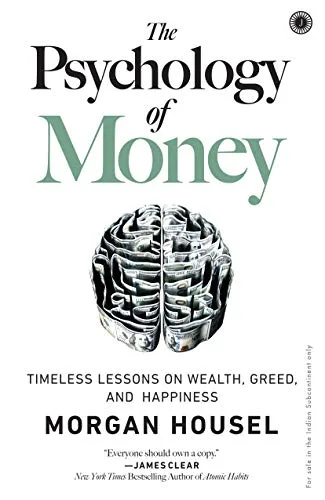The Psychology of Money by Morgan Housel (2020) | ISBN 978-93-90166-27-5
No matter how hard you try, you can never stop yourself from making the mistake of understanding the idea of money in a purely emotionless manner. And, that is why, for reasons well know, it is said that “Some people are so poor that all they have is money”!
 In a very pithy and pious manner, Morgan Housel, a partner at The Collaborative Fund, talks turkey to his readers, when he states, “Money is everywhere, it affects all of us, and confuses most of us. Everyone thinks about it a little differently. It offers lessons on things that apply to many areas of life, like risk, confidence, and happiness. Few topics offer a more powerful magnifying glass that helps explain why people behave the way they do than money. It is one of the greatest shows on Earth”. Replete with lots of real-life incidents, anecdotes, wise quotes and his good-natured advice, Housel decries the thought that humans are always rational, balanced, logical and coherent in their conduct. It is never so, as the author reveals again and again the foils of a fogged up mind, as in the cases of why poor people buy lottery or even in the cases of why ethical millionaires would resort to disreputable ways just to join the billionaire clubs.
In a very pithy and pious manner, Morgan Housel, a partner at The Collaborative Fund, talks turkey to his readers, when he states, “Money is everywhere, it affects all of us, and confuses most of us. Everyone thinks about it a little differently. It offers lessons on things that apply to many areas of life, like risk, confidence, and happiness. Few topics offer a more powerful magnifying glass that helps explain why people behave the way they do than money. It is one of the greatest shows on Earth”. Replete with lots of real-life incidents, anecdotes, wise quotes and his good-natured advice, Housel decries the thought that humans are always rational, balanced, logical and coherent in their conduct. It is never so, as the author reveals again and again the foils of a fogged up mind, as in the cases of why poor people buy lottery or even in the cases of why ethical millionaires would resort to disreputable ways just to join the billionaire clubs.
With a well-thought out structure for The Psychology of Money, this book is definitely a well titled and appropriately labeled book. Housel cautions that outward appearances are deceptive, when it comes to money-making and spending. For instance, readers would be aware of how India is still grappling with the idea of bringing back the two famous fugitives, who have duped banks to the tune of crores of rupees. However, nothing in their outward appearance and behavior would have revealed their spirit of fugitive-ness. The author goes on to state: “We tend to judge wealth by what we see, because that’s the information we have in front of us. We can’t see people’s bank accounts or brokerage statements. So we rely on outward appearances to gauge financial success. Cars. Homes. Instagram photos. Modern capitalism makes helping people fake it until they make it a cherished industry. But the truth is that wealth is what you don’t see. Wealth is the nice cars not purchased. The diamonds not bought. The watches not worn, the clothes forgone and the first-class upgrade declined. Wealth is financial assets that haven’t yet been converted into the stuff you see. That’s not how we think about wealth, because you can’t contextualize what you can’t see”. Sometimes he takes a dig at us, and sometimes he is genuine is his counsel. Sometimes it is a bitter warning, and sometimes it is a gentle admonition. In all, reading this book is an experience itself, not for its stiff content, but for its unadulterated manner of influencing our perceptions about money.
Let me share a few thoughts from this book, which will help in judging its insides, as well as taking an unambiguous call on the intention of the author. Apropos the money-time nexus that is widely talked about, this is what Housel has to say: “Money’s greatest intrinsic value – and this can’t be overstated – is its ability to give you control over your time”. As with regards to grim money matters, Housel is explicit: “Do not aim to be coldly rational when making financial decisions. Aim to just be pretty reasonable. Reasonable is more realistic and you have a better chance if sticking with it for the long run, which is what matters when managing money”. And, more to the point, in connection with the oft-discussed luck-risk conundrum, this is what Housel affirms: “If you give luck and risk their proper respect, you realize that when judging people’s financial success – both your own and others’ – it’s never as good or as bad as it seems”.
All things considered, you would find The Psychology of Money, not just appealing and interesting, but also clear-sighted, prescient and incisive. According to Housel, doing well with money, as you would have noticed by now, “isn’t necessarily about what you know. It’s all about how you behave”.
Perhaps, Jonathan Swift was wide off the mark, when he stated, “A wise person should have money in their head, but not in their heart”, because Morgan Housel’s book goes on to prove just the opposite. When you get right down to money issues, everyone thinks about it a little differently.
G Narasimha Raghavan, an independent researcher based out of Coimbatore, Tamil Nadu.
Email: [email protected]

















































